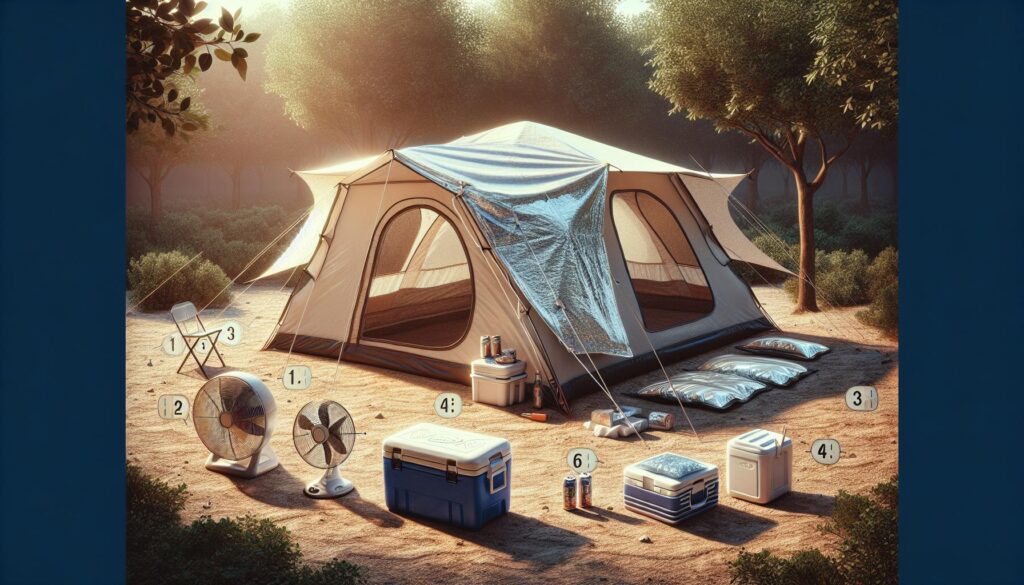Discover how you can effectively beat the heat when camping. In this guide, we reveal essential tips including maximizing ventilation, utilizing portable fans, and taking advantage of ice packs to maintain a cool and comfortable tent environment.
Camping is an enjoyable venture into nature, but the conditions in your tent can quickly become unbearable when the temperature rises. You can lead the charge against the heat by implementing several strategies including optimizing ventilation, utilizing portable fans, and cleverly placing ice packs or cold water bottles within your tent. In this guide, we’ll delve deeper into these strategies, providing hands-on tips to keep your tent cool and comfortable, regardless of the weather conditions.
Table of Contents
Tip 1: Opt For Shaded Locations
Starting with the basics, the choice of where you set up your tent can greatly impact the temperature within. A shaded spot, under the canopy of trees or other naturally occurring shade, can protect you from the scorching sun, maintaining a relatively cooler tent interior. Direct sunlight sends the heat inside your tent skyrocketing, making it a poor choice for relaxation or sleep. Therefore, prioritize shaded spots, particularly during the peak sun hours of 10 a.m. and 4 p.m. If natural shade is not available, a tarpaulin or canopy thrown over your tent can make a substantial difference.
Tip 2: Maximize Ventilation
Maintaining a cool tent environment heavily relies on proper ventilation. By keeping the tent’s windows and doors open, air can freely flow in and out, reducing the inside temperature and bringing in fresh air. A fan, particularly when placed strategically, can help circulate fresh air inside the tent, leading to a cooler and more comfortable environment. Furthermore, creating a cross breeze by opening up vents or windows on opposing sides of your tent allows hot air to exit and fresh air to enter, keeping the interior temperature in check.
Tip 3: Leverage Reflective Surfaces
Make use of reflective surfaces to lower the temperature in your tent. Reflective tarps or blankets placed on the tent’s exterior can bounce off solar radiation, minimizing the amount of heat absorbed. Additionally, light-colored tents are excellent at reflecting solar radiation as opposed to absorbing it, courtesy of their high albedo. Therefore, to keep your tent cool, consider investing in light-colored tents and reflective materials.
Tip 4: Incorporate Cooling Devices
Investing in portable air conditioners or misting fans designed for tents can contribute greatly to cooling down your tent. These handy devices, due to their compact and portable nature, are excellent companions for any camping trip. They provide a refreshing breeze and circulate the tent’s air, leading to a significant drop in temperature.
Additionally, utilizing ice packs or frozen water bottles can be highly effective in cooling tents. When placed within the tent, these items deliver a cooling effect, particularly when positioned near sleeping or resting areas.
Tip 5: Stay Hydrated And Dress Comfortably
Hydration plays a key role in maintaining a cooler tent. Drinking ample water not only safeguards against dehydration but also helps regulate your body temperature. Water aids in cooling your internal body temperature, particularly when taken in the right amounts. Moreover, staying cool in your tent can be enhanced by wearing breathable and loose-fitting clothing. Loose clothing allows air to circulate around your body, reducing heat buildup, while breathable fabrics wick away sweat, keeping your body cool and dry.
Common Questions About Cooling Down A Tent
How Do I Keep My Tent Cool?
To keep your tent cool and comfortable, employ strategies such as using reflective tarps or blankets, choosing shaded locations for setting up your tent, opening up vents and windows to enhance air circulation, and using ice packs or cooling pads. These methods are geared towards reducing internal tent temperature, ensuring a pleasant camping experience.
Do Different Types Of Tents Stay Cooler?
Specific types of tents are indeed better suited for heat resistance. Tents with ample ventilation options, light-colored exteriors, and made from breathable materials offer a cooler environment. Additionally, tents designed with a gap between the rainfly and the tent body encourage improved air movement, thus helping keep the interior cooler.
Being knowledgeable about tent materials can also help. Cotton, for instance, is a breathable material excellent for hot weather as it allows airflow while blocking out light. On the other hand, nylon and polyester trap heat due to their non-breathable nature.
Wrap-up: Keeping Your Tent Cool
Keeping a cool and comfortable tent during your camping adventure need not be a challenge. By implementing the five strategies discussed in this guide – choosing shaded locations, maximizing ventilation, leveraging on reflective surfaces, incorporating cooling devices, and staying hydrated and comfortably dressed – you are well on your way to enjoying a delightful camping experience, free from the discomfort of a hot and stifling tent. Happy camping!
Are you wondering how to cool a tent down swiftly under the blazing sun? We’ve got you covered. Here’s are five effective tips, including maximizing tent ventilation, clever use of portable fans, and turning ice packs or cold water bottles to your advantage to ensure a comfortably chilled tent. These strategies are indispensable for making the most of your outdoor adventures, even in the heat of summer.
Tip 1: Prefer Shady Locations to Pitch Your Tent
Choice of location plays a significant role in determining the internal temperature of your tent. Setting up camp in locations with shade is one crucial precaution you can take to keep your tent cool. Positioning your tent under trees or in areas that offer natural shade throughout the day shields it from direct sunlight, ultimately keeping the internal temperature low. Seeking shade is particularly crucial during 10 a.m. and 4 p.m., which are typically the hottest times of the day. If natural shade isn’t available, consider setting up a tarp or canopy over your tent to create some.
Tip 2: Prioritize Ventilation
Good ventilation is key to maintain a comfortable temperature within any enclosed space, and tents are no different. Ensuring proper air circulation inside your tent is as simple as keeping windows and doors open, allowing the fresh breeze to replace the hot air inside. Portable fans can also be used to further boost air circulation. Creating a cross-breeze by opening opposing vents, windows, or doors can also cool down your tent’s interior effectively.
Tip 3: Utilize Reflective Surfaces
Reflective surfaces can also serve as your allies in your quest to cool your tent. Reflective tarps or space blankets placed over your tent can fend off a significant portion of the sun’s radiation, thus reducing the heat absorbed by your tent. Light-colored tents, equipped with their high albedo, can further help in reflecting sunlight and staying cool. These measures can maintain the internal temperature at comfortable levels, ensuring a pleasant camping experience.
Tip 4: Take Advantage of Cooling Devices
Consider bringing along cooling devices like portable air conditioners or misting fans designed especially for camping. They’re compact, portable, and provide a soothing breeze, significantly reducing the overall temperature inside the tent.
Ice packs or frozen water bottles can also be effective in cooling down your tent. The cold air emanating from them, especially when placed near sleeping or resting spots, can significantly chill the nearby air.
Tip 5: Hydrate Adequately and Dress Suitably
When camping in hot weather, hydration isn’t only crucial to your health—it can also affect your comfort inside the tent. Consuming an adequate amount of water throughout the day can help cool down your body, subsequently affecting the immediate surroundings. Moreover, wearing breathable and loosely fitting clothing can also significantly increase your comfort in a tent. These types of outfits allow air to flow near your body, aiding in cooling by evaporating sweat.
Frequently Asked Questions—Chilling Your Tent Efficiently
Which Types of Tents Are Easiest to Cool?
Some tent designs are significantly more conducive to cooling. Usually, they feature large mesh panels or numerous doors and windows for increased ventilation. Some tents also have built-in features like vents that can be adjusted or rainflys that can be propped for improved air circulation.
What Should I Do to Cool My Tent in Hot Weather?
In the face of hot weather, you can stay cool in your tent by employing additional cooling strategies. For starters, set up your tent in a shady area or make use of a shade canopy if possible. Leave the tent doors and windows open to let the air circulate freely. A portable or battery-operated fan can aid in air circulation, providing a pleasant breeze. Lastly, minimize the use of heat-emitting devices like stoves and lanterns while inside the tent.
Can I Use Ice Packs or Cold Water To Cool My Tent?
Yes, ice packs or cold water can definitely aid in cooling down your tent. Placing a container within your tent, filled with ice or cold water, can lower the temperature inside as the water evaporates or the ice melts. However, it’s paramount to prevent any water damage to your camping gear as the ice melts.
Wrap-up: Stay Cool, Enjoy More!
By mastering these five tips—setting up camp in shady spots, improving ventilation, using reflective surfaces and cooling devices, and staying properly hydrated—you’re set to enjoy a blissfully cool and comfortable camping experience, even in hot conditions. Remember, these tips not only ensure your comfort and a great night’s sleep but also enable you to stay refreshed and ready for all the fun outdoor activities that await. Don’t let the heat beat you—stay cool and continue to enjoy the great outdoors!














